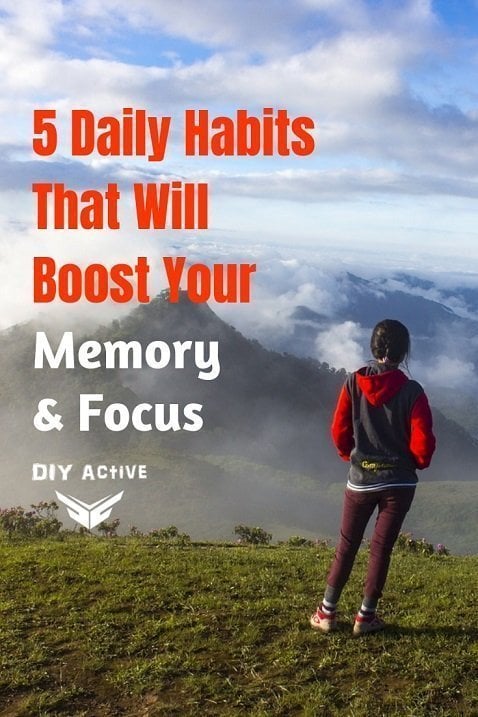
Want to Boost Your Memory and Focus?
A human being’s memory and ability to focus tend to get weaker as one gets older. Aging is inevitable, but this does not mean that we should let our mental abilities fade away with age. There are a few daily habits that can help to boost cognitive function.
Tips that will boost your memory and focus
Psychologist Dorian Crawford of C&C Psychological Services states that our habits can help or hinder memory.
As we attempt to accomplish every task in our busy schedules, the brain does not get a chance to assign information to memory. The visible effects of poor memory include when one finds himself in a room without any idea of why he is there.
This article will help you to understand how practicing certain habits every day can help to boost your memory and focus.
1. Writing Important Things on Paper and Keeping Distraction Lists
It is easier to store memory of written things. When you write, you engage your body in a memory process and encourage the mind to give more attention to the task at hand.
You can even read out what you have written down to solidify the thought.
Three experiments carried out in 2003 by researchers Daniel Oppenheimer and Paul Mueller showed that writing by hand involves “mental lifting” that forces students to summarize ideas (1).
Mental lifting increases conceptual understanding, retention, and application. Writing details of tasks is a good habit that anyone trying to improve their memory should work.
Distractions are unavoidable in just about every task. There are many ways to handle them, but one tested and proven strategy of maintaining focus is acknowledging them.
Writing down a distracting thought when it pops up in your mind can help you to refocus on the task at hand.
This way of acknowledging a distraction works if you tell yourself that you will take care of it later. It helps to free the mind so that it can focus on the essential things you are doing at any given time.
Usually, when you identify and list down a stray thought that intrudes your concentration, it doesn’t come back.
2. Counting Your Breath – Increases Focus
Another science-backed method of refocusing the mind is taking some sets of deep breaths.
This intervention has been found to work even for highly distracted people. Counting your breath is a mindfulness task that involves counting groups of 9 complete breaths: 9 inhales, and 9 exhales.
 A 2016 test by Gorman and Green showed that a short breathing exercise is sufficient to refocus the mind of a highly distracted person (2). The study examined heavy media multitaskers.
A 2016 test by Gorman and Green showed that a short breathing exercise is sufficient to refocus the mind of a highly distracted person (2). The study examined heavy media multitaskers.
These individuals tend to develop a state of distributed attention due to the nature of their work. Performing this mindfulness task helped them to focus deeply on a single job.
Gorman and Green note that although no one can stay focused on one thing indefinitely, counting breath can help to bring back attention when it starts slipping away.
3. Meditation: Why Is It Necessary for Memory and Focus?
Lovers of meditation know that great ideas come when the mind is relaxed.
Critical mind shifts can occur when the mind is clear and calm. Breakthroughs are possible when the mind is given some time off. As Albert Einstein once said, the same mindset that created problems cannot be used to solve them.
A daily break of five to ten minutes from your busy schedule can help to calm your mind and pull it out of unproductive thought patterns.
The practice of meditation has been found to improve memory while offering other benefits including stress reduction, pain, and blood pressure management.
The area of the brain responsible for memory is sometimes referred to as the gray area and is made up of neuron-filled gray matter. Meditation increases this gray matter and thus positively impacts cognition and memory.
Studies on different meditation techniques have shown that this memory-boosting strategy improves short-term memory among people of all ages.
For instance, a study carried out in Taiwan demonstrated that college students who engaged in meditation had better spatial working memory than those students who did not regularly practice meditation. Spatial working memory is the mind’s capability to store and process information about the positions of objects in space.
To compound the benefits of relaxation, try meditation while tent camping in your favorite getaway destination.
4. Exercise in the Morning
It is believed that the best thinking happens in the morning hours, or even better, during the morning exercise routine. Early morning physical activity has been proven to expand memory, creative thinking, and brain processing.
Whatever exercise you love doing, whether it is running, yoga, or basketball training, doing it in the morning will help to grow your mind.
Morning exercise also allows you to focus better on your tasks during the day as you know you have already accomplished one task.
One game that is particularly helpful in boosting the mind’s ability to focus is a dart game. If you want to grow your attention skills, play dart games regularly.
Dart trains the mind to concentrate before engaging the rest of the body in a physical task. It also helps to maintain a positive mindset since you are always determined to hit the area of the dartboard that you need to strike to win. No negativity comes into your mind when you are aiming.
Each throw helps to relax the brain and build confidence.
5. Proper Sleep for Memory Improvement
Due to the vital role sleep plays in memory consolidation, its lack or deprivation is associated with poor memory. Memory consolidation is the process by which short-term memories are enhanced and transformed into long-term memories.
Many studies have been carried out on the effects of sleep deprivation on memory.
A recent study examined the effects of sleep in 40 children aged between 10 and 14 years. One group was trained for a memory test in the evening, they were allowed to sleep, and the test was administered the following morning.
The other group was trained and given the test the same day, without any sleep between training and test time. Test results showed that the group of children that had time to sleep between training and testing portrayed better performance than the group that did not sleep.
In a similar study, night shift nurses were found to make more mathematical errors in a memory test compared to daytime nurses (3).
Brain health experts recommend that adults sleep between seven and nine hours every day for optimal health.
As study results show, there is a strong relationship between sufficient sleep and memory performance.
According to “Memory–a century of consolidation” by McGaugh JL, sleep in human beings, and all mammals are characterized by two main sleep stages: slow-wave sleep (SWS), and rapid-eye-movement (REM) sleep.
These two stages alternate, with SWS being predominant during the early part of the sleep session, and REM intensifying toward the end of the period.
It is SWS that is responsible for the transformation of several representations and their integration into a long-lasting memory. You should, therefore, make sure that you practice proper sleep habits that will support this process and boost your mind.
Wrap-Up
It is great to know that there are science-backed habitual ways to boost your memory and focus.
The methods discussed above are easy to incorporate into one’s lifestyle. If you follow these memory and focus boosting techniques consistently, you will most likely start seeing improvements within a few weeks.
- How To Improve Memory And Focus With 5 Daily Habits - December 21, 2018



